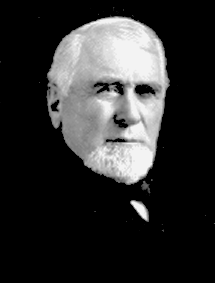

1843-1923
United
States Senator, Governor of Minnesota
BORN IN VOSS, NORWAY, on Feb. 2, 1843, Knute Nelson immigrated to the United States in 1849 with his mother. They settled in Chicago, then moved to Wisconsin the following year, where Knute attended school.
His studies at Albion College were interrupted by the Civil War. He served as a private and noncommissioned officer with the Wisconsin Volunteer Infantry, and was wounded and taken prisoner at Port Hudson, La., in 1863.
At the close of the war, Nelson returned to college and attained his degree, then undertook law studies. He was admitted to the bar in 1867 and commenced practice in Cambridge, Wis.
Nelson's career in politics began when he became a member of the Wisconsin assembly, serving from 1868-1869. He moved to Alexandria, Douglas County, Minn., in 1871 and was county attorney from 1872-1874. Then he became a member of the state Senate, from 1874-1878; a presidential elector on the Republican ticket in 1880; a member of the Board of Regents of the University of Minnesota, from 1882-1893; and a member of the U.S. House of Representatives, serving on the Republican side of the aisle, from 1883-1889).
Nelson did not stand for reelection in 1988. He was elected governor of Minnesota in 1892, and reelected in 1894 and served until January 31, 1895, when he resigned, preparatory to becoming a U.S. senator. He was elected to the Senate in 1895, being the first person born in Norway to attain that post. Nelson was reelected in 1901, 1907, 1913, and 1918, serving until his death.
During the 1899 debates over ratification of the Treaty of Paris, under which the United States gained possession of Cuba, Puerto Rico, Guam, and (at a cost of $20 million), the Philippines, opponents warned that this would cast the United States in the role of an imperialist. Nelson countered: "Providence has given the United States the duty of extending Christian civilization. We come as ministering angels, not despots."
Parting company with most Republican legislators, he favored antitrust legislation, creation of an income-tax, and U.S. membership in the League of Nations. He played a major role in the creation of the Department of Commerce and Labor.
Nelson died on a train near Timonium, Md., on April 28, 1923, while en route to his home.
